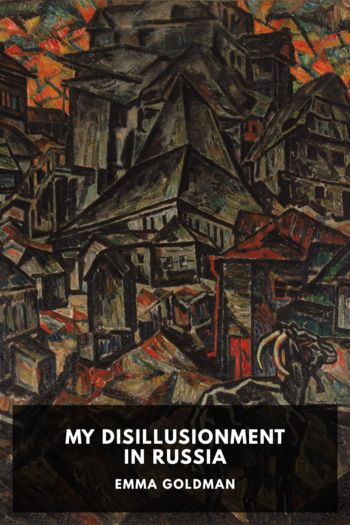The Point of Vanishing Maryka Biaggio (hardest books to read TXT) 📖

- Author: Maryka Biaggio
Book online «The Point of Vanishing Maryka Biaggio (hardest books to read TXT) 📖». Author Maryka Biaggio
Saturday was sunny and pleasingly warm, and the drive scenic—over rolling hills crowned with spruce and fir, by rippling grain fields, and past farmhouses with overhanging roofs. Herr Künstler’s sweetheart arrived on foot shortly after they unpacked.
“This is my Hilda,” he said. He seemed abundantly proud of his miss—a buxom, cheery girl with a mop of thick black hair. After introductions, Herr Künstler took Hilda’s arm, explaining they must mend the fence before their Saturday walk to the village for coffee and kuchen. Herr Künstler and his sweetheart apparently had an arrangement that extended only to cottage stays, and he seemed reluctant to waste a minute of it.
✭
After a few days of exploring and acquainting themselves with the neighboring farmers and patchy forests, Helen, Barbara, and Nick settled into the rhythms of country life. Twice daily, the tinkle of cowbells announced the flock of cows, sheep, and goats herded up to and down from pasture. The menagerie always stopped beside their cottage fence and drank from the carved-out log fed by the same trickling spout from which they gathered their water.
Helen planned to use this time to finish the book about her and Barbara’s South Pacific travels. On a typical day, the three of them breakfasted together, and then Nick set off to hike and photograph. Barbara usually joined him, though some days she stayed at the cottage and used Helen’s typewriter to transcribe her penciled sheets—a story about her Appalachian Trail adventure—while Helen edited her typed pages.
One day, while she and Barbara enjoyed a mid-day meal of fried eggs, tomatoes, and hearty bread, Helen risked some prying. “What will you do when Nick starts his job in Boston?”
“Maybe find some work there. And write, of course.”
“Have you two talked about a future together?”
Barbara gave her the squint eye. “I suppose you mean marriage.”
“Oh, has it been mentioned?”
“We both think the best way to be married is not to get married.”
“That’s a peculiar philosophy.” My God, Helen wondered, how far is she going to carry this arrangement? “As your mother, I must say it’s not necessarily in your best interest.”
“I don’t care about people’s ludicrous morals. What good is marriage anyway?”
“It’s a pledge. And affirmation to others.”
“We don’t need to prove anything to anybody.”
“What about Cynthia? The girl Nick was practically engaged to last year?”
“She’s just somebody his mother thinks he should marry.”
“Does she live in Boston?”
“Yes, but that doesn’t mean he’ll be seeing her.”
“He’s not engaged?”
“How ridiculous, Mother. How could he be engaged and travel with me for a year now?”
“I just want what’s best for you, dear.”
“You don’t need to worry about me. I can take care of myself.”
That was as much as Helen could get out of her. Although Nick seemed a nice enough fellow, there was something stiff and distant about him. Helen simply couldn’t get a sense of what went on inside him—whether he was contented or restless or had any particular passions, outside of a workman-like interest in photography. He seemed staid and unimaginative, quite the opposite of Barbara. Maybe once they wrapped up their great Wanderjahr and got back to the humdrum world, things would cool between them. And that, she thought, would be for the best.
The three of them passed the time agreeably enough, sharing the cottage on Saturdays and Sundays with Herr Künstler and his sweetheart. Then, one Saturday, nearly two months into their stay, Hilda failed to appear, and Herr Künstler turned sullen. In the afternoon, he wandered off for the rest of the day. Helen awakened in the middle of the night to the sound of him trudging up the stairs.
The next morning, she could hear shuffling around in his room, but Herr Künstler failed to come down for breakfast. Helen decided to leave him to himself and organized a berry-picking expedition. She, Barbara, and Nick returned a few hours later with three baskets of raspberries and settled in the kitchen, keeping their voices low. They’d only begun rinsing the berries when a sharp crack sounded, followed by a thud.
Startled, Helen eyed Nick, then Barbara. “What was that?”
“Sounded like a rifle.” Nick hurried to the base of the stairs and called out, “Herr Künstler.”
“Something’s wrong.” Helen shoved her chair back and stood.
Barbara lifted her nose to the air. “What’s that smell? Do you smell something burning?”
Helen called upstairs, “Herr Künstler, Herr Künstler.”
No response. She bounded up the stairs, with Nick close behind, and beat at Herr Künstler’s door. Then she smelled it—burning wood—and heard the crackle of flames. She twisted the doorknob and tried to push the door open. It wouldn’t budge.
“Let me try.” Nick put his shoulder to the door and shoved. It gave only an inch. Smoke oozed out. “It’s barricaded. With his dresser.”
“My God,” Helen said. “We’ve got to get to him.”
Nick rammed the door hard. It resisted, bouncing him back. “It won’t give.”
“Herr Künstler,” Helen yelled. There was no response.
“We shouldn’t feed the fire,” Nick said. “It’s too dangerous.”
Helen tried to push past Nick. “But Herr Künstler’s in there.”
Nick closed the door, grabbed her hand, and pulled her down the stairs. “We have to get out.”
Barbara ran upstairs to her and Nick’s bedroom. “I’m getting my things.”
Nick galloped up after her.
Helen gathered the typed pages of her book and wrapped them in a cloth. They had to get Herr Künstler out, somehow. Was there a ladder on the property? No, she’d not seen one. She called to Barbara and Nick, “Get my typewriter and clothes. I’m going to the Vogel’s.”
Helen ran out, deposited her bundled pages beside the pathway, and dashed the quarter-mile down the road. She stumbled up to the Vogel’s porch, her lungs burning from the strain. She beat on the door. The stout Mrs. Vogel flung it open.
Helen motioned back to the cottage. Flames leaped from the window of Herr Künstler’s room, licking hungrily at the air.
“Herr Künstler’s in there,” Helen said in





Comments (0)